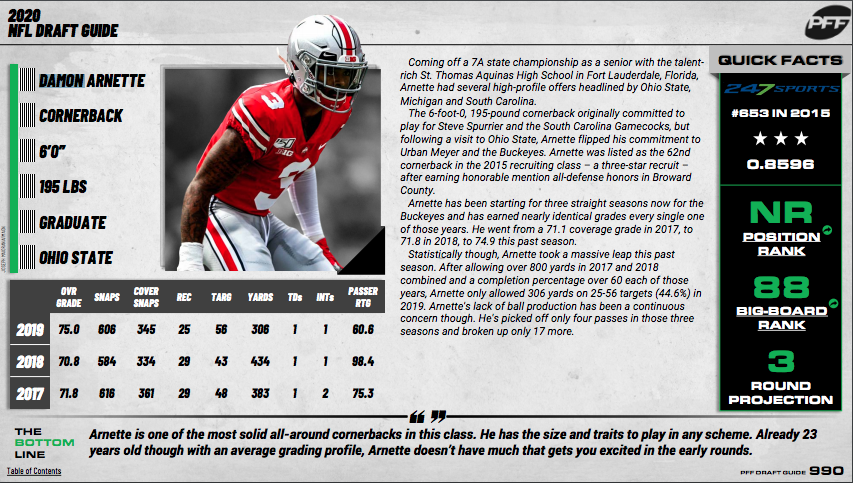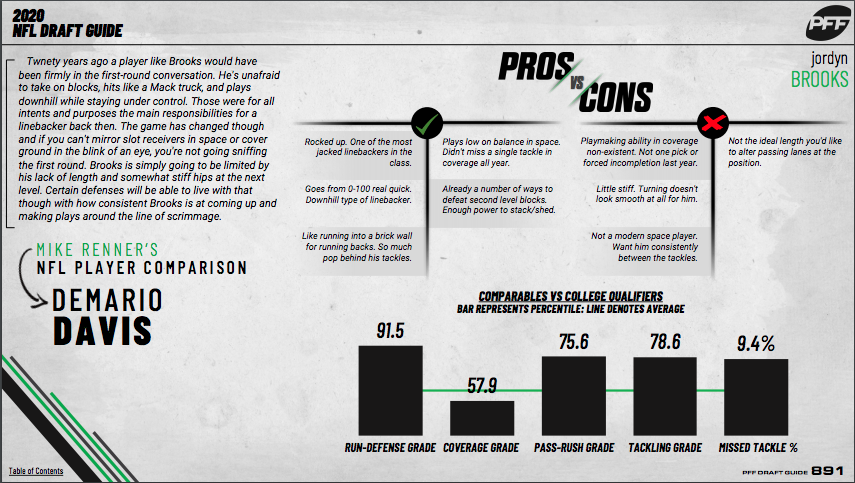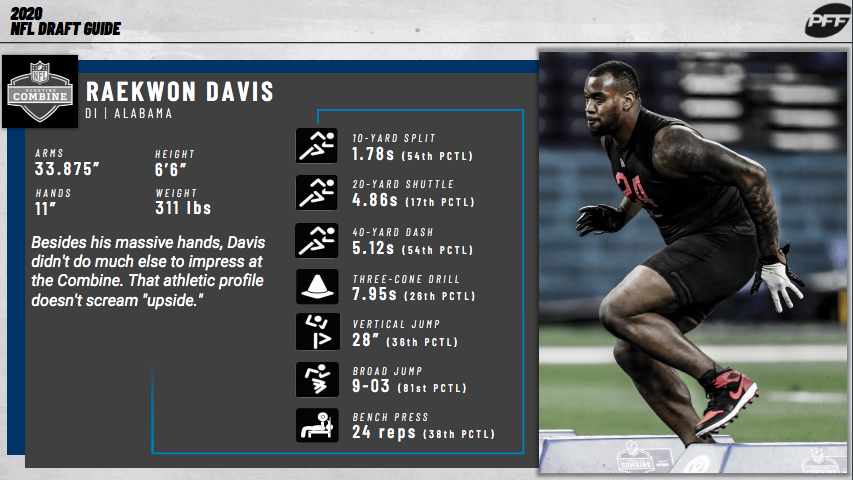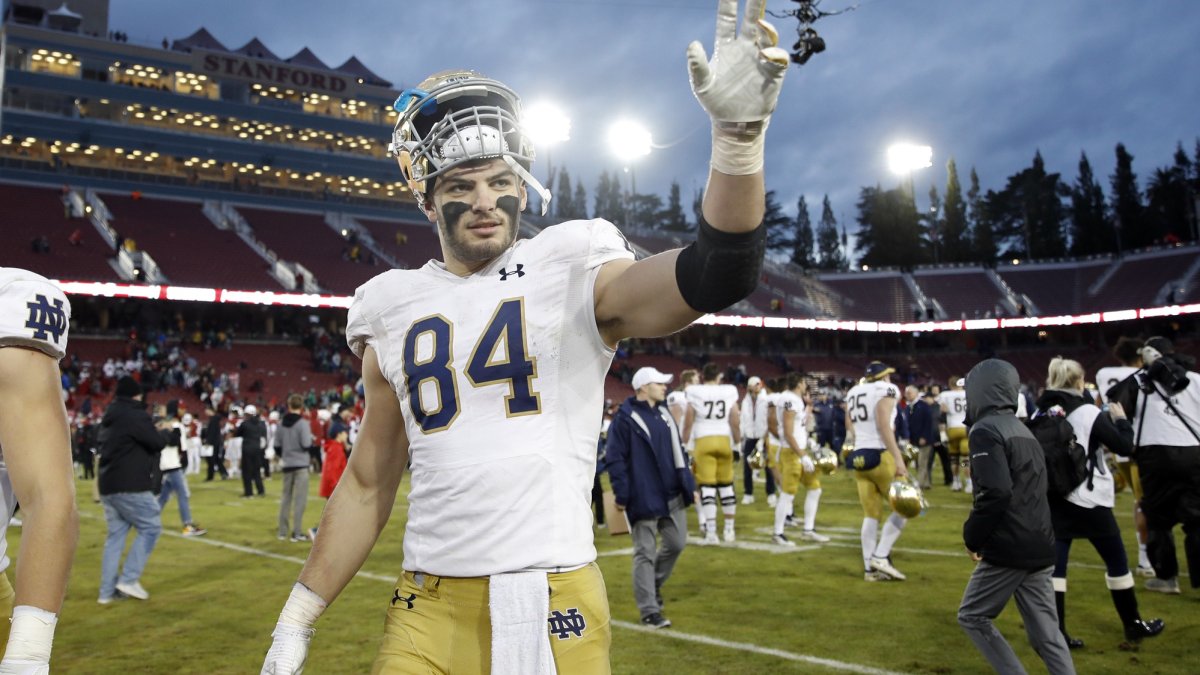So, the 2020 NFL Draft is in the books. While it’s true that we really only get a full view of each class several years down the line, the fact that we have yet to see them play an NFL snap doesn’t mean that we know nothing right now.
As much as some would like to believe that PFF grades and analysis on the picks are entirely pointless at this stage, we can evaluate the process and outcome based on what we know now with the caveat that players can change, develop or struggle at the next level in a way that nobody saw coming.
[Editor’s Note: PFF's instant analysis on EVERY pick of the 2020 NFL Draft can be found here. You can also find all of our pre-draft and up-to-the-minute analysis categorized and readily available here. Get your copy of the PFF 2020 NFL Draft Guide today by clicking here.]
With that in mind, here are the players who I think were the biggest reaches of the draft. And because nobody likes the guy who shows up only with problems and not solutions, I've also given the players I would give the team instead if it had a mulligan on that selection.
For the purposes of this piece, I’m also going to omit quarterbacks. I think both Justin Herbert and Jordan Love were significant reaches, but quarterback value is so immense that it trumps everything else. If you believe that guy is the future of the franchise, take him wherever you want, I won’t hate that.
Pick 18: Miami Dolphins — OT Austin Jackson, USC
This became less of a surprise the closer to the draft we got. Jackson was getting significant first-round buzz as the draft approached and was ultimately selected with the second of Miami’s three first-round selections.
Jackson was taken 76 spots higher than his rank on PFF’s Big Board, so it's obvious we view this as a significant reach. The former USC tackle is a project offensive lineman, but he has all the tools to develop into a quality starter at the next level. His play against the best competition he faced in college was always the worst of his tape, and he never topped 75.0 in overall PFF grade in any year of his career. The component pieces are there for him to become a quality NFL player, but he wasn’t even an outstanding college player, so the distance he needs to travel as a player is significant — that makes him a Day 2 player at best in our eyes.
Replacement pick: WR JALEN REAGOR, TCU
With the slide of Houston's Josh Jones, the Dolphins could have got a superior tackle further down. And while No. 18 wouldn’t have been the easiest of spots to identify value, they could have added weaponry for new quarterback Tua Tagovailoa and come back around for pass protection later. Reagor would have added some real dynamism to a receiving corps that’s still a significant question mark.

Pick 19: Las Vegas Raiders — CB Damon Arnette, Ohio State
For the second year in a row, the Raiders have shown that they value their board significantly more than everybody else's, whereas the best drafters are equally adept at playing the other 31 teams as they are at identifying talent.
Arnette may have been higher up the Raiders’ board, but that’s still not a reason to have drafted him so early, especially when they almost certainly could have taken him later on and received better value (and potentially even an extra pick if they’d been able to trade down to make it happen). Arnette was No. 88 on PFF’s Big Board, and while there are reasons to like his potential, there are significant question marks, as well. He showed well in man coverage and in certain critical factors in PFF’s data, but he’s old (24 before the season), slow (he ran a relatively pedestrian 4.56 40-yard dash) and is entirely absent of length (he has 30-inch arms). These are not positive traits for a man-coverage specialist, so so the Raiders' pick is a risky one that doesn’t come close to maximizing the value of the draft spot.
Replacement pick Pick: CB JAYLON JOHNSON, Utah
Johnson ended up slipping all the way to the Chicago Bears at pick No. 50 — likely due to injury concerns — but he was a better player in college, ranked higher on PFF’s Big Board (24), is younger (21) and, in my eyes at least, actually fits better schematically in Las Vegas than Arnette does unless the Raiders are making significant changes in terms of the coverages they ran. Given where Johnson was ultimately drafted, you can make the argument that it would have been seen as just as big of a reach, but I think this pick, had it been Johnson over Arnette, would have been received significantly more favorably.
Pick 20: Jacksonville Jaguars — EDGE K'Lavon Chaisson, LSU
This selection was always going to land on this list. The NFL is clearly higher on Chaisson than PFF is, and if the Jaguars didn’t take him at 20, somebody else was taking him in the first round. So, this isn’t a reach in terms of where the rest of the league valued the player, but it's one in terms of what his college tape says he justifies.
Chaisson was No. 46 on PFF’s Big Board, and it’s easy to see why NFL teams love him. He has the athleticism and skills to be a much more productive player than he has been throughout his college career, and he has maintained that play against better competition. The issue is that the level of baseline play as a pass-rusher has been neither dominant nor prolific. The highest number of total pressures he generated over a single season was 35, which ranked 50th just among edge rushers in this draft last season alone. We’ve been burned by athletic yet unproductive LSU edge rushers in the past (Danielle Hunter, for example), but Chaisson doesn’t seem to fit the same template and is a player PFF probably wouldn’t have gambled on for another round.
Replacement Pick: S XAVIER MCKINNEY, Alabama
Versatile safeties who can change defenses somehow have a habit of slipping down the draft. Derwin James inexplicably lasted deep into the first round, and McKinney did much the same job as Isaiah Simmons did without the same fanfare because he simply has a regular safety build. McKinney could provide the Jaguars' defense with a matchup weapon to combat the players who are tearing up the league right now. Instead, they took a project pass-rusher.

Pick 27: Seattle Seahawks — LB Jordyn Brooks, Texas Tech
Oh, Seattle … Why do I feel like this was somehow always going to come to pass?
The Seahawks do things their own way, and they don’t care too much where the rest of the world has players ranked. Jordyn Brooks isn’t a bad player, but at No. 64 on PFF’s Big Board, he represents a pretty significant reach at the bottom of the first round. He represents the embodiment of the cautionary tale that if the first thing you mention is “run defense,” the player probably isn’t worth a really high pick. He’s an incredibly sure tackler and maybe the best run defender at the position in the draft, and if this were the 1990s instead of 2020, a first-round pick would be where he belongs. However, the league has moved on, and coverage has never been more important. His grade in coverage this past season was 57.9 — a below-average mark compared to his peers. His stiffness in coverage is a concern if the Seahawks project him to be a successor to K.J. Wright or Bobby Wagner.
Replacement pick: LB PATRICK QUEEN, LSU
The fact that Patrick Queen was drafted by the Baltimore Ravens just one spot later only highlights the Seahawks' reach here. Queen was ranked more than 30 spots higher on PFF’s Big Board and was the best true linebacker in the draft (with Isaiah Simmons a Swiss Army knife as much as a linebacker). Queen is a difference-maker in coverage, and though he hasn’t been as solid against the run as Brooks, he’s been more solid in that facet than Brooks has been in coverage. Given that distribution, you’d take the guy who wins in the passing game every time.
Pick 29: Tennessee Titans — OT Isaiah Wilson, Georgia
The No. 111 player on PFF’s Big Board made it into the first round. Wilson is a classic man-mountain of an offensive lineman, whose size comes with enough downside that there’s a real question mark about whether he plays tackle or guard in the NFL.
Wilson was protected to a reasonable degree with help at Georgia, and he goes to a team in the Titans that has experience doing that for their linemen, so maybe he looks as good at the next level. But if you’re going to go to that kind of trouble, it feels as if they'd be better served spending the time and effort on a superior college player. Wilson has only surrendered two sacks over the past two seasons, but because of his limitations in agility and leverage that his size creates, he was a player we expected to be picked at least a round or two later.
Replacement pick: CB KRISTIAN FULTON, LSU
Funnily enough, Tennessee’s draft picks look much better from a value standpoint if you just flip them around. Fulton is one of my favorite picks in the entire draft when it comes to a player-scheme fit, and I think his tape says he is well worth a first-round pick, particularly one as low down as Tennessee’s. If they’d have taken Fulton in the first round, it seems unlikely that Wilson would have been taken before their second-round selection came up. Ultimately, they secured both, whichever way around they did it, but the Wilson pick in a vacuum seems like a significant reach, albeit one later offset by one of the steals of the draft.
Pick 43: Chicago Bears — TE Cole Kmet, Notre Dame
Of course, the Chicago Bears used the first pick they had on a tight end — to add to the dozens already on the roster. This was a terrible offseason to need help at that position between free agency and the draft, but the Bears somehow dipped their toe into the market in both opportunities, signing Jimmy Graham in free agency before Cole Kmet in the draft.
Kmet was No. 98 on PFF’s Big Board, and though he has all the prototypical size and measurables you want, he has yet to show the kind of production that would propel him this far up the draft. He has just 691 receiving yards in his college career, and while he demonstrated sure hands, he hasn’t shown that he can be a truly dynamic player at the position.
Replacement pick: WR DENZEL MIMS, Baylor
He slid a little on draft day, but Denzel Mims is still an excellent receiver and the Bears still need more weapons than just Allen Robinson II. Mims had the highest grade PFF has ever given during the week of Senior Bowl practices, where he was completely uncoverable in the one-on-one drills and then went to the combine and tested out as a 95th-percentile athlete. He could have really moved the needle for the Chicago offense, far more so than a tight end.

Pick 56: Miami Dolphins — DI Raekwon Davis, Alabama
Davis has been a solid player throughout his Alabama career but is the latest in a sequence of Alabama defensive linemen who seem to have more to their game than they have ever demonstrated consistently. Davis has plays on tape that would more than justify this pick — he is the definition of a “can-do” player — but the issue is that he has never done it on a consistent basis. He has been a plus run defender — the less valuable facet of the game — but has never topped 34 total pressures over a season and actually generated fewer sacks than the previous year for two straight seasons.
Replacement pick: DI Jordan Elliott, Missouri
Javon Kinlaw or Derrick Brown didn’t post the best pass-rushing grade among interior players against only SEC opposition — that accolade actually belonged to Jordan Elliott. He is one of the best penetrating pass-rushers in this draft from an interior alignment and did it at a very high level against elite competition. This past season he earned an overall PFF grade of 92.4 and had one of the best first steps of any pass-rusher. He’s a player PFF believed was worth a first-round selection, and the Dolphins could have had him deep into the second round.
Pick 62: Green Bay Packers — RB A.J. Dillon, Boston College
Oh boy. A.J. Dillon was the first player drafted who wasn’t even on PFF’s Big Board. It wasn’t because we forgot about him or that he wasn’t good in college, but it was simply because his skill set is anachronistic for today’s NFL.
Dillon is a bruising power-back who harks back to an era of smashmouth football that has largely been left in the past. Even the most run-heavy offenses in the NFL at the moment rely on speed and space more than they do a 250-pound running back pushing the pile up the middle. There is a big danger that Dillon is a re-run of Leonard Fournette in terms of a player who dominated smaller college competition but just doesn’t have the skill set to do the same thing against NFL defenders.
Replacement pick: LB WILLIE GAY JR., Mississippi State
Mississippi State's Willie Gay Jr. is a player who could have transformed Green Bay’s defense in an instant, and he was taken just one pick after Dillon. Gay comes with significant risks — he dealt with injuries and suspensions and has fewer than 900 career snaps in college — but without those risks, he’s a clear first-round talent. He may have the best coverage chops of any linebacker in this draft and the absurd range to genuinely influence plays.



 © 2024 PFF - all rights reserved.
© 2024 PFF - all rights reserved.